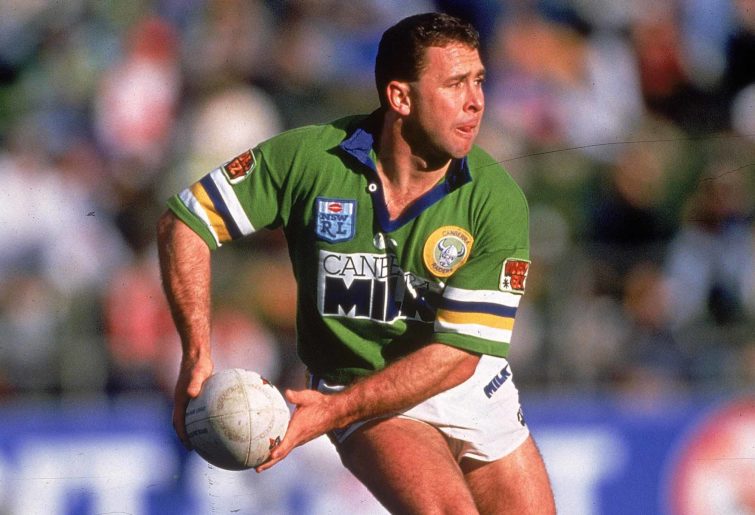2024 NRL Transfer Centre: Souths land Super League half, Three-team trade confirmed
NRL signings, contracts and rosters for the 2024 season and beyond.
Opinion
It could be argued that many games of rugby league hinge on a few key moments: a dropped ball with the line wide open, a missed field goal or according to most fans a refereeing decision or two, or three.
If we cast our gaze a little wider than this, we can identify other sliding doors moments that may have changed the very nature of rugby league in Australia and around the world.
In this fourth and final installment we look at a selection of such moments relating to international rugby league and some brief comments on what might have happened.
What if England had won an Ashes World Cup during the 1990s?
After falling to pieces in the late 1970s as the rise of professionalism in Australia caught England unawares, the English had multiple chances to win an Ashes Series in the 1990s, plus two close losses in World Cup finals.
This was on the back of their most recent ‘golden generation’, which included such names as Ellery Hanley, Andy Farrell, Martin Offiah, Andy Gregory, Garry Schofield, Joe Lydon, Dennis Betts and Lee Jackson.
Perhaps the two closest calls for the Kangaroos were these: in 1990 Australia were saved from going down 2-0 in the Ashes by a long-range try engineered by a Ricky Stuart show and go.

(Photo by Getty Images)
Then in the 1992 World Cup final, a record crowd for any international rugby league match saw England leading with 12 minutes to go, only to be denied by a sublime Kevin Walters pass putting ‘The Pearl’ Steve Renouf through to score. If only Kevvie could have taught that pass to Tyson Gamble!
If either or both of these matches had been won by the English, what would have happened? National news coverage, for a start.
Over 73,000 delirious England supporters heading back north from Wembley, full of lager and passion for rugby league. Renewed determination by Australia to avenge their defeats? A continuing emphasis on international football? A continuation of Kangaroo and Lions tours?
Maybe there would be more money flowing into the British game and a player flow in both directions between the two premier rugby league competitions.
Could a richer English game have made more inroads into France or invested more time and money in Toronto and New York? Would Australia be lamenting its habitual inability to win on the cold northern fields of England? We will never know.
What if the Vichy regime in World War II France had banned rugby union instead of rugby league?
It’s a reasonably well known fact that the French rugby union aligned itself with the Vichy regime in France to protect its ongoing interests and at the same time rugby league was banned as a sport and had its assets seized.
While the ban was overturned, and France was still a very strong national side throughout the 1950s, the repercussions of this event were severe and long lasting.
Eventually, losing the game in the north of the country and therefore the associated national footprint and revenue streams meant that rugby league remained on the back foot and was almost entirely consumed as a top-tier sport by its union cousin.
In recent times there has been something of a resurgence with Catalans and Toulouse joining the English Super League, but it’s a long road back to their previous status in the game which saw them finish as World Cup runners-up in 1954 and 1968.
If World War II had no effect on the relative fortunes of the two rugby codes, would France have remained a strong rugby league nation? I think so, although inion would still have remained the No.1 code.

France’s Antoine Dupont (centre) lifts the trophy with team-mates after winning the Six Nations after the Guinness Six Nations match at the Stade de France (Photo by Adam Davy/PA Images via Getty Images)
The working class areas to the south and north of France may have continued to embrace the professional code (not that rugby union in France was every really that amateur) and France would have remained a significant player on the world stage.
This in turn may have allowed easier acceptance and spread into other European countries over time, such as Italy. A slightly more competitive world wide structure could have resulted. This would make each World Cup a more uncertain and richer experience, which in turn may have diverted more interest and investment into the international game.
What if Toronto had remained in the English Super League and were joined by New York?
It’s the Holy Grail, isn’t it? Somewhere, somehow, sometime a sport originating in the Commonwealth or Europe (i.e. one of the rugby codes, football or cricket) cracks the American market. Untold riches follow as the purchasing power of the largest economy on the planet (at least today) is plowed into the sport.
The only problem is that it’s never happened, not even a little bit. Cricket in the US remains the domain of sub-continent expats in amateur outposts around the country, rugby union is played in some colleges but it’s been a heck of a slog to gain any traction.
The first and last Australian tour by a USA rugby league side occurred in 1953 and resulted in exactly zero take up of the sport, which was exactly matched in influence by the famed 1987 non-Origin in California.
But the Holy Grail remains.
Then the English Super League were given the opportunity to gain a foothold in Toronto, one of the largest cities in North America and one not far away from Detroit, Chicago, Cleveland and New York. But COVID hit and at the same time the English clubs turned inwards and the opportunity was lost.
The Canadian side were removed from Super League and the code’s latest American adventure was over.
But what if Toronto had been successful? What if the Super League had taken a long term view that North America was a place to be? What if the next proposed franchise, operating out of New York City, no less, had commenced and started working its way through the divisions?
Be under no illusions, Canada and the USA were not going to suddenly embrace rugby league as a top-tier sport over their traditional NFL base. But the opportunity for some actual investment was there.
In a few short years, Canada and the USA may have been part of a World Cup, leading to further investment. In a decade or two home grown players may have been holding their own, some colleges may have been running rugby league teams. There may have been a semi-professional competition centred around the northeast of the continent. Maybe, maybe.
But instead England turned inwards with funding a problem. Clubs feared relegation if expansion was embraced. Australia were not interested in furthering the global game, being too busy squabbling about the six-again rule and propping up decrepit suburban grounds.
Global vision was fairly blind and the game has retreated to its few communities in northern England, Queensland and NSW.
And we wait, for the next sliding door and ponder, what if?
I only have one ‘What if?’ at the moment: what if Cameron Munster captains The Dolphins in 2024?
CLICK HERE for a seven-day free trial to watch the NRL on KAYO